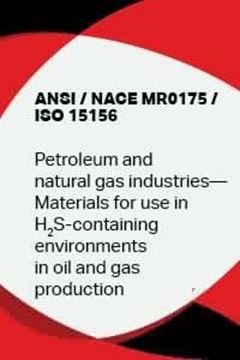Search
ANSI/NACE/ISO MR0103-HD2010, Materials Resistant to Sulfide Stress Cracking in Corrosive Petroleum Refining Environments
Also Purchased
ANSI/NACE MR0175/ISO 15156-2015
Product Number:
21307-SG
ISBN:
MR0175/ISO15156
Publication Date:
2015
$255.00
ANSI/NACE MR0175/ISO 15156-1 Technical Circular 1 (2017)
Product Number:
15156-1-SG2017
Publication Date:
2017
$0.00
ANSI/NACE MR0175/ISO 15156-2 Technical Circular 1 (2017)
Product Number:
15156-2-SG2017
Publication Date:
2017
$0.00




